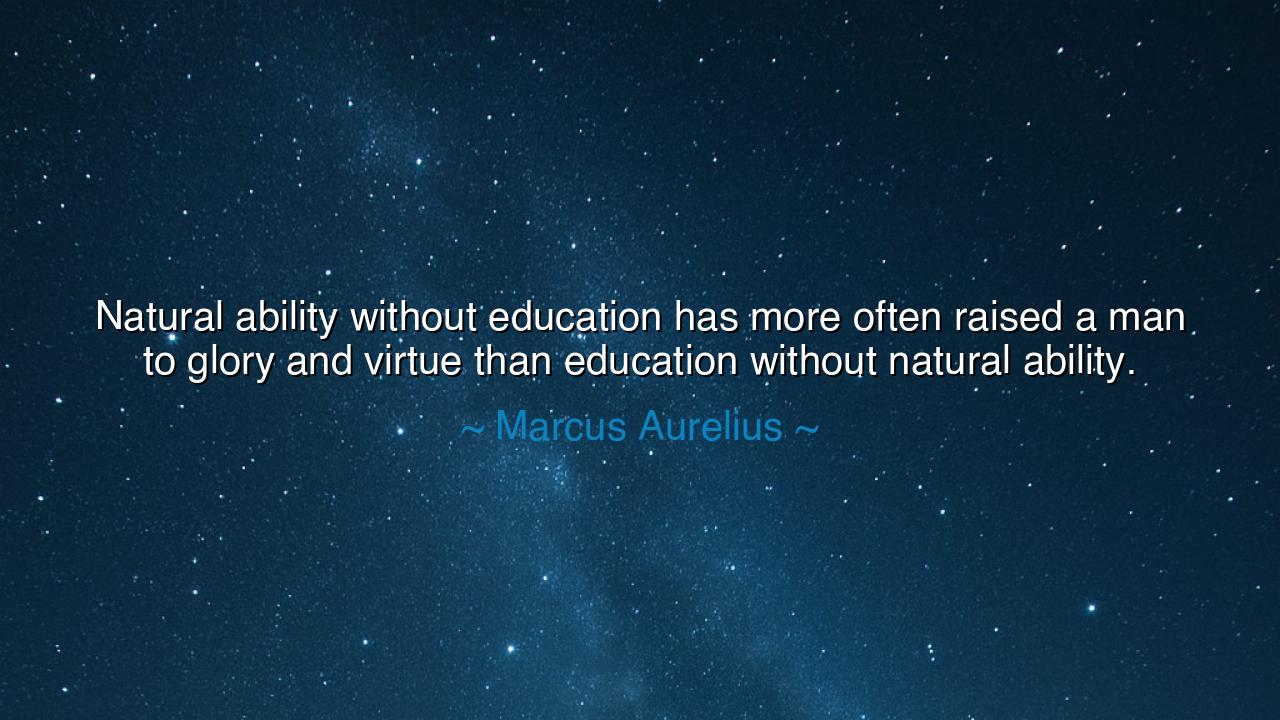
Natural ability without education has more often raised a man to
Natural ability without education has more often raised a man to glory and virtue than education without natural ability.






Hear the voice of Marcus Aurelius, philosopher and emperor, who declared: “Natural ability without education has more often raised a man to glory and virtue than education without natural ability.” In this saying is contained the austere wisdom of Rome, born of one who had seen both scholars and soldiers, poets and rulers, rise and fall. Marcus reminds us that learning, though powerful, is not the sole foundation of greatness. There is within each soul a spark of natural ability, a divine gift of mind, heart, or hand, that, when awakened, can lift a person higher than bookish learning alone.
The emperor knew well the limits of mere schooling. A man may sit among scrolls, recite the teachings of philosophers, and adorn himself with the titles of the academy. Yet if he lacks ability, if he has no strength of character, no talent for action, no fire of spirit, then his education becomes an ornament without use, a vessel filled with water that is never poured. By contrast, the one endowed with natural ability—though rough and untrained—can, through courage, diligence, and opportunity, rise to heights where scholars remain bound.
History offers many examples of this truth. Consider the story of George Washington. His formal education was modest; he never studied in the grand universities of Europe. Yet his natural ability—his judgment, his leadership, his steady resolve—raised him to command armies and found a nation. Meanwhile, countless highly educated men of his age, versed in Latin and philosophy, remained obscure, their talents buried beneath the weight of theory. Washington’s life proclaims Aurelius’ wisdom: that glory and virtue spring more readily from innate gifts awakened by discipline than from education without talent.
Think also of Joan of Arc. She had little learning, could not read nor write, and yet by her natural ability—her fierce conviction, her unshakable courage, her clarity of vision—she led armies and inspired a people. Her greatness was not the product of tutors or libraries, but of the fire within her soul. In her, the spark of natural ability burned brighter than the cultivated wisdom of her learned adversaries, and through it she entered history as a figure of virtue and sacrifice.
This is not to scorn education, for Marcus Aurelius himself was a student of philosophy, nourished by the wisdom of the Stoics. Rather, his saying reminds us of balance. Education refines, but ability ignites. Without the spark, the lamp remains dark, no matter how much oil is poured into it. With the spark, even a little oil burns brightly. To rely only on schooling without discovering one’s innate strengths is to labor in vain. To find one’s natural ability and then sharpen it with learning—that is the path to true greatness.
The lesson for us is clear: know thyself. Seek not only degrees and diplomas, but the discovery of your gifts. Ask: what comes naturally to me? What talents has life placed in my hands? For it is there that your path lies. If you have voice, cultivate it; if you have strength, discipline it; if you have vision, guide it. Let education serve your ability, not attempt to replace it. For when both are united, the result is not mediocrity, but destiny.
Practical action flows from this truth. Do not envy the highly educated if you feel your gifts are modest. Instead, nurture the flame of your natural ability, for it can carry you far beyond what books alone can grant. But also, do not despise education, for it is the chisel that shapes the raw stone of talent into a statue of glory. Balance the two: discover your gift, and then seek knowledge to perfect it.
So let Marcus Aurelius’ words resound through the ages: natural ability has raised more men to glory and virtue than education without it. Honor your gift, strengthen it with learning, and live not as a scholar only, nor as a talent wasted, but as a whole being—one whose inner fire, sharpened by wisdom, lights the world.






AAdministratorAdministrator
Welcome, honored guests. Please leave a comment, we will respond soon